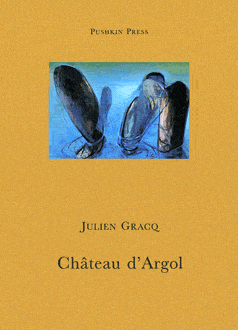 Gracq’s somewhat decadent, very symbolist French novel from 1938 reads like a cross between Borges and Cocteau.
Gracq’s somewhat decadent, very symbolist French novel from 1938 reads like a cross between Borges and Cocteau.
In telling the story of a trio of youths, two men and one women, who live out an erotic and violent fever dream in a remote house in the middle of a large wood, Gracq remains so abstract, so image-oriented and philosophical, avoiding all discourse direct and indirect, that Chateau d’Argol sometimes comes off as the schema for a much larger Romantic work of feeling and insanity. It is short and relentless.
Its unique strengths and weaknesses are best shown by this quote:
As though borne along by the web of an exalting music, his limbs seemed the prisoners of the fatal laws of a number–although a primary one in every respect–and his step majestic beyond all measure and at every moment plainly oriented, seemed to Albert the materialization, shorn for the first time of all kinds of grotesquely aesthetic veils, of what Kant has caused, mysteriously enough, purposiveness without purpose.
The old translation, by Louise Varese, reads like it was translated extremely closely from the French, as French sentence structure seems evident everywhere. This produces a jarring awkwardness that dampens the spell Gracq is trying to cast, but the consistency of the weird style does eventually create a certain otherworldliness of its own.
Gracq was friends with surrealist Andre Breton but I’m not aware if he knew Cocteau. Will has more on Gracq.
Leave a Reply